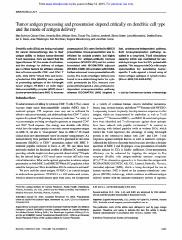Please use this identifier to cite or link to this item:
https://ahro.austin.org.au/austinjspui/handle/1/9830| Title: | Tumor antigen processing and presentation depend critically on dendritic cell type and the mode of antigen delivery. | Austin Authors: | Schnurr, Max;Chen, Qiyuan;Shin, Amanda;Chen, Weisan;Toy, Tracey;Jenderek, Corinna;Green, Simon;Miloradovic, Lena;Drane, Debbie;Davis, Ian D;Villadangos, Jose;Shortman, Ken;Maraskovsky, Eugene;Cebon, Jonathan S | Affiliation: | Ludwig Institute for Cancer Research, Austin Health, Heidelberg, Victoria, Australia | Issue Date: | 16-Nov-2004 | Publication information: | Blood 2004; 105(6): 2465-72 | Abstract: | Dendritic cells (DCs) are being evaluated for cancer immunotherapy due to their unique ability to induce tumor-directed T-cell responses. Here we report that the type of human DC, the mode of activation, and the strategy for delivery of antigen are 3 critical factors for efficient stimulation of tumor-specific CD8+ and CD4+ T cells. Only CD1c+ blood DCs and monocyte-derived DCs (MoDCs) were capable of presenting epitopes of the full-length tumor antigen NY-ESO-1 on both major histocompatibility complex (MHC) class I (cross-presentation) and MHC II, whereas plasmacytoid DCs were limited to MHC II presentation. Cross-presentation was inefficient for soluble protein, but highly efficient for antigen-antibody immune complexes (NY-ESO-1/IC) and for protein formulated with ISCOMATRIX adjuvant (NY-ESO-1/IMX). DC activation with CD40L further enhanced cross-presentation efficiency. The mode of antigen delivery was found to be a determining factor for cytosolic proteolysis by DCs. Immune complexes (ICs) targeted a slow, proteasome-dependent cross-presentation pathway, whereas ISCOMATRIX (IMX) targeted a fast, proteasome-independent pathway. Both cross-presentation pathways resulted in a long-lived, T-cell stimulatory capacity, which was maintained for several days longer than for DCs pulsed with peptide. This may provide DCs with ample opportunities for sensitizing tumor-specific T cells against a broad array of tumor antigen epitopes in lymph nodes. | Gov't Doc #: | 15546948 | URI: | https://ahro.austin.org.au/austinjspui/handle/1/9830 | DOI: | 10.1182/blood-2004-08-3105 | Journal: | Blood | URL: | https://pubmed.ncbi.nlm.nih.gov/15546948 | Type: | Journal Article | Subjects: | Adjuvants, Immunologic.administration & dosage Antigen Presentation.drug effects.immunology Antigen-Antibody Complex.immunology Antigens, Neoplasm.administration & dosage.immunology CD4-Positive T-Lymphocytes.immunology.pathology CD8-Positive T-Lymphocytes.immunology.pathology Cancer Vaccines.administration & dosage.immunology Cells, Cultured Cholesterol.administration & dosage.immunology Dendritic Cells.immunology.pathology Drug Combinations Epitopes, T-Lymphocyte.immunology Female Histocompatibility Antigens Class I.immunology Histocompatibility Antigens Class II.immunology Humans Lymph Nodes.immunology.pathology Male Melanoma.immunology.pathology.therapy Membrane Proteins.administration & dosage.immunology Monocytes.immunology.pathology Phospholipids.administration & dosage.immunology Plasma Cells.immunology.pathology Proteasome Endopeptidase Complex.immunology Saponins.administration & dosage.immunology |
| Appears in Collections: | Journal articles |
Files in This Item:
| File | Description | Size | Format | |
|---|---|---|---|---|
| 15546948.pdf | 366.26 kB | Adobe PDF |  View/Open |
Page view(s)
28
checked on Jan 9, 2025
Download(s)
178
checked on Jan 9, 2025
Google ScholarTM
Check
Items in AHRO are protected by copyright, with all rights reserved, unless otherwise indicated.
